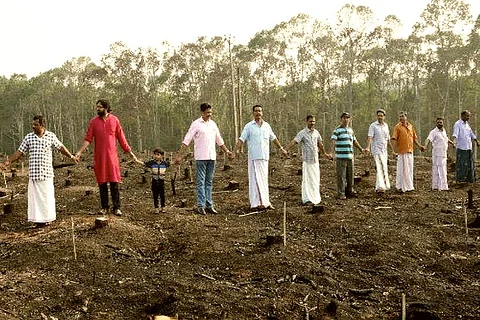

The Kerala government has decided not to plant acacia trees which draw water on a large scale from the earth. Three months ago, people of Palode in Thiruvananthapuram had begun an agitation by forming the Agasthyamala Biosphere Conservation Forum. The agitation along with the acute water crisis prompted the government to take the decision two weeks ago.
"The protest was organised at various spots. Around 300 people participated in the human chain. Not all the people were convinced though about the cause. But we had the support of women," said Pramod GS, General Secretary of the Forum.
Around 40 years ago, acacia auriculiformis, acacia mangium and Eucalyptus were planted in the regions that fall under the Western Ghats of the state. The drawing of excess water from the earth by these exotic species over the years, transformed the regions into the most drought hit.
The trees planted in places like Vithura, Palode, Tholikode, Aryanad, Nedumangad, Peringamala in Thiruvananthapuram and in Thenmala and Punalur in Kollam, draw water in excess in the tropical conditions, according to experts.
On April 4 Chief Minister Pinarayi Vijayan irdered to cut down all the Acacia and Eucalyptus trees from government land across the state. The government has instead decided to replace them with fruit-bearing trees. to plant fruit trees in these places.
Professor Abdul Ayub, who retired as head of department of Botany at Iqbal College Peringammala, told The News Minute, “Acacia is naturally found in arid conditions which is why the people of Kerala sometimes refer to it as alien trees. It draws water in excess in the tropical conditions which reduces the groundwater level.” He is also convenor of the technical committee of Agasthyamala Biosphere Conversation Forum.
The protests against cutting off or not planting the trees in Thiruvananthapuram were isolated and this is the first time that it got a consolidated form. The people organised a human chain at Pandian Para and held a meeting in front of the Palode Range Office as a part of the protest.

“The most important thing we did as a part of the protest was to create awareness among the people about the water loss caused by the trees, through Kudumbashree workers. The trees also caused asthmatic and allergy problems to the people, about which also we could sensitise the people. We also took classes on the adverse effects of growing these tress,” said Abdul Ayub.
Making pulpwood was one of the reasons for growing these trees in the areas near the forest. Zero maintenance, fast growth and study trunks are the other reasons for the forest department to opt for these trees. The sale of the wood to paper factories turned out to be an income-generating source for the Forest Department. The trees’ wood can be cut off every eight years for this purpose due to their fast growth. The trees live for a maximum of 30 years.
“The planting of these trees began in 1977, but it was done in various parts of the state in different years and this is the first time it was being planted again in some places. The decision not to plant them and to cut off the existing trees when they become old is a welcome move,” said Abdul Ayub.
DK Murali, MLA representing the Vamanapuram constituency, moved a calling attention motion in the Assembly on Monday to which the forest minister K Raju said that the trees will not be planted again. “The government has made its decision clear on it, the severe scarcity of water prompted us to take this decision. The trees draw excess water,” said Murali.